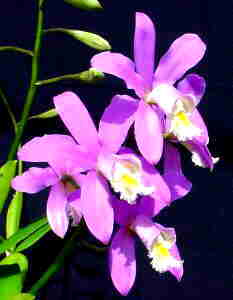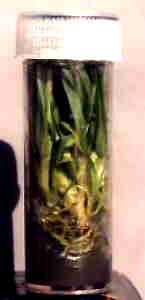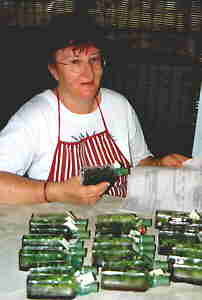NewsletterTemplate
BP SPECIES
NEWSLETTER December 2002
July00
Aug
Sept
Oct
Nov
Dec
Jan01
Feb
Mar
April
May
June
July
Aug
Sept
Oct
Nov
Dec
Jan02
Feb
March
April
May
June
July
Aug
Sept
Oct
Nov
WHATS NEW ?
IMPORTANT NOTE. click here for NEW
PHYTOSANITARY Certificate news, EXDOC.
IMPORTANT
NOTE click here for USA importers. Phytos & Permits.
We wish you all the best for a safe and happy Christmas and
New Year.
In FLASK.
Acinetia superba, Dendrobium palpaebrae, Dendrobium
farmerii albiflorum, Dendrobium farmerii
pink,  Peristeria
elata. Peristeria
elata.
In PLANTS.
Dendrobium vandoides, Angraecum sesquipedale varigata
x self, Oncidium spacelatum.
Ready
to replate. Acinetia
chrysantha, Cattleya harrisoneae, Cattleya walkeriana, Laelia gouldiana,
Phalaenopsis sanderiana.
Culture.
Conservation by Flask
.
Did you
know?
Important New Phyto news, electronic generated Phytosanitary
Certificates. Worldwide exchange of seed and protocorm. Permits
USA. Bank Fees, hidden costs.
Web Site.
www.speciesorchids.com New Links plus more photographs up.
Your Message on the net.
Put your message IN FRONT of the international
readers of this Newsletter each month or on YOUR PAGE on the net.
Orchid Auction.
Plants, Flasks, Books.
Flasking
supplies, medias, nonabsorb cotton wool. Notes
on flasking.
Seed
for sale. Email
now for a list of available species orchid seed.
Spare Flasks
on hand. Some species flask
that can be shipped NOW.
Humour.
Subscribe,
Unsubscribe.
Requests. Click here for Flask
List Plant
List New
Germinations Spare
flasks.
It is our policy to avoid spam, so lists are sent on
request.
Photos in this issue. Above
Cattleya harrisoneae. Highlighted
species are links to photos/articles, sterile
Tube for replate, Patricia and flasks..
Items in this Newsletter may be reproduced
provided source acknowledged. Do you know any orchid growers who may like
to receive this newsletter? Why not forward this email to them now!
A b&w printed copy of this Newsletter can be
mailed each month if you send 12 Australian stamps or 12 International
reply coupons to Burleigh Park Orchid Nursery, 54 Hammond Way, Thuringowa,
Australia 4815.
We commend "Orchids Online
Web Design" for the excellent work on our web site.
For information or prices click
here or email Steve at steve@orchidsonline.com........
Steve is looking for Orchid
Society and Orchid Nursery Information to include on his site.
If you can help, why not
visit his website at http://www.orchidsonline.com.au
and fill in
the online form now
New
in Flask.
Acinetia superba. A species
from Ecuador, Colombia. Showy waxy 5cm flowers, pink heavily spotted purple,
almost black. Fragrant. Best grown in a basket in a media that will stay
damp, but not wet, intermediate, shady.
Dend palpaebrae. An
evergreen species similar to Dend farmerii and the like. Flowers
are white flushed pink, the lip yellow. See Dend farmerii
link for growing conditions.
Dendrobium
farmerii albiflorum . The white, yellow lip form from Thailand.
Dendrobium
farmerii pink . The pink flushed form from India
Peristeria
elata . Panama Dove Orchid. This species from Panama
and other Central American countries, is one of about 6 in the genus. They
are not all terrestrials like P. elata, a couple being epiphytes.
Peristeria elata grows best in a media
similar to that used for Phaius, a good rich leaf-mould and well
drained coarse sandy soil, well crocked. Seasonal in growth, it rests
during our cooler dry winter and in spring starts new growth. At
that time copious water and fertiliser will produce tall spikes for
Christmas, of waxy, fragrant white flowers. ( For a full article on Peristeria,
visit November
Newsletter. )
Top
New
in Plants.
Dendrobium vandoides.
A New Guinea leafy stemmed species with unusual large white flowers.
It grows best in a pot in a media that will stay damp but not wet. A native
of the warm wet tropics, it likes lots of water while growing, which seems
to be most of the time. 5cm pot seedlings
Angraecum sesquipedale varigata x self.
This is a selfing of a plant that had
a white stripe in the leaf. A Madagascan species, it likes a basket or
ventilated pot in an open media that drains well. The flowers are large,
wax like, with a long spur, and highly fragrant. Warm to intermediate grower,
will take a fair amount of sunlight. sesquipedale, literally a foot and
a half, in reference to the long spur. 5 cm pot seedlings
Oncidium
spacelatum. This is a large clumping species from Central America.
Our plants are from seed collected in Mexico and have been previously listed
as Oncidium species Mexico.
Best grown in a large basket, maximum air
movement and will take very strong sunlight. A warm to intermediate grower
with a branched spike to six feet or more, with hundreds of flowers. Near
flowering size plants are doing well in slotted pots in spaghnam
mix.
.
Top
Ready
to Replate.
Acinetia
chrysantha, The Acinetias tend to be cooler growers from the cloud
forests of Central America. Acinetia chrysantha comes from Costa Rica and
grows best in a small basket much the same as Stanhopeas. The media should
be rich, well drained but retaining enough moisture so that the roots do
not dry out. Flowers are born on a long pendulous spike, each flower up
to 5cm in diameter, yellow with fine red spots and red spotting on
the labellum. A shady well ventilated spot is needed to protect the
soft foliage.
Cattleya harrisoneae. Photo
at top. A warm to intermediate growing Brazilian bifoliate Cattleya. This
species can grow to be a large robust plant requiring a large well drained
pot or basket, good ventilation and sunlight. The media should be
open, apply adequate water and fertiliser when growing, and cut water when
the plant rests after flowering. Cattleya harrisoneae flowers will
reach up to 10 cm across, and the larger the plant, the more flowers will
be produced per spike.
Cattleya
walkeriana. With waxy flat rose
purple, 13cm flowers, heavy textured, Cattleya walkeriana is best
grown on a slab of treefern with extra water and fertiliser. The species
will also grow well in a pot or basket, where it will spread out into a
specimen. After flowering the plant should be rested. Maximun sunlight
and ventilation is required to maximise flowering. Warm to intermediate
Brazilian species.
Laelia gouldiana is
a Mexican species, best grown in a small pot or basket much the same way
as a cattleya. It is a cool to intermediate grower, with tall spikes
of rose coloured large flowers.
Macodes lowii is
a very showy, large growing Jewel orchid from Borneo. The leaf is veined
and reticulated metalic pink on a dark green black background. It is an
ideal windowsill subject in a terranium, grown in a mixture of coarse sand
and leafmould or similar media that will stay damp but not wet. It
rests in the cooler months and grows in the shade.
Phalaenopsis sanderiana. A
large leafed species with dark green black leaves, dark purple underneath.
The plant grows much the same as P stuartiana and the like, and
produces a spike of large pink flowers, the pink sometimes veining. A warm
grower from the Philippines, typical Phalaenopsis culture.
Species highlighted are links to photos.
More photos at www.speciesorchids.com/photos.html
Top
Culture.
Conservation.
In
the nursery, orchid seed is sown from either dry seed or green seed pod.
The seed is sown in a wide mouth bottle on its side, which makes for easier
seedling handling when replating.
Once germinated and grown on the nutrient
gel media to about 6 mm high (quarter inch), the seedlings are transferred
to fresh media bottles. In effect, the seedlings are being thinned out
and put into new bottles to grow larger.
Some species develop quickly, while
others are slow and require this replate thinning out into fresh bottles
again. In some cases, particularly Cattleya, Laelia, and their allies ,
this procedure can be repeated several times to get the seedlings to a
large size ready for the final replate.
Before seedlings get too large, the
seedling/protocorm material can be replated into small unbreakable polycarbonate
tubes, also onto nutrient gel. The tubed seedling material will then grow
and pack tight inside the tube, ideal for airmail post  world
wide. world
wide.
These tubes, on receipt, are then replated
into a large jar or flask for growing on to a stage where they can be deflasked.
The advantage of this procedure is the quicker production and the ease
in which tubes, only weighing 40 grams each, ( about one and a half
ounce), can be airmailed cheaply, and that more seedling material can be
put into each tube.
Once seedling in the mother flasks have reached
a good size, small glass flasks are prepared to order, each containing
usually 12 to 14 seedlings. These flasks are then grown on until the seedlings
fill the flask, which helps prevent shake up in the shipping.
At this stage, larger seedlings are used for the
final flask and smaller seedlings are replated into fresh mother flasks
to await the next order. The advantage of this is the storing of live plant
material in flask that could be best described as a "protocorm Bank."
When the seedling in the flask have grown and packed
tight inside the flask, the flasks are ready to ship. Airmail Post or Air
Courier Express transports flasks world wide, from one flask to 60. Preference
is given to Air Courier service where parcels are carried and not placed
in a mailbag.
When flasks arrive, they need some time to
acclimatise. Seedlings can be left in the flask for a considerable time,
so it is best to leave seedlings to continue growing to a size where you
feel confident about deflasking. There is seldom any need to deflask immediately.
Even if seedlings are shaken up, they can usually be persuaded to
reposition on the gel media and continue to grow. ( Gently tap the flask
so that seedlings sit on the media).
For those growers with access to replating
facilities, a transfer to a large jar will produce even larger seedlings.
For details on deflasks go to
Deflask
. Photos, Tube of protocorm, seedling material ready to airmail.
Patricia with flasks for shipping.
Orchids from flask; The best conservation.
If more species are cultivated like this, then the wild populations
of the species can be conserved.
More photos at
www.speciesorchids.com/photos.html
Top
Did
you know ?
From the end of 2002, Australian Quarantine Inspection Service
switches to an electronic generation of Phytosanitary Certificates. This
new system is called EXDOC, and Phytosanitary Certificates are printed
on security paper at the point of export.
We suggest that importers ask their local Inspection Office
if they are aware of this new system and that Certificates will appear
different to the previous forms.
No problems are anticipated as we are assured all countries accept
EXDOC, but it comes down to the person at the final inspection, we trust
they also know!
Most countries accept the international standard Phytosanitary
Certificate for the importation of plants and flasks where required.
Some countries require additional declarations and these are detailed on
that countries Import Permits.
Australian Phytosanitary Certificates will only list additional
declarations if an Import Permit is supplied with the requirements detailed
on the Permit.
Countries now requiring a Phytosanitary Certificate ( standard
) include USA, Canada ( flasks), Israel, Vanuatu, New Zealand, Japan and
Sweden.
Countries that require additional declarations include Reunion,
Tahiti, Canada ( plants only), so an Import Permit must be supplied.
For details on other countries email click
here and lists will be emailed to you.
Do you set seed pods on your
treasured species orchids? The best conservation, sow seed, you will then
know where to find them again.
IMPORTANT NOTE for USA importers.
USDA has, from January 2002, begun to enforce the requirement for
a Phytosanitary Certificate for all plant and plant material imports.
This is not a new regulation, but the implementation of a rule that has
previously not been enforced.
ALL FLASKS imported into USA will now require a Phytosanitary
Certificate.
Burleigh Park does provide this Phytosanitary Certificate at cost.
Flasks are still CITES exempt.
Click
here for the full details previously published.
Phytosanitary Certificate requirements for all countries.
We are preparing a data base for the import requirements for Phytosanitary
Certificates for as many countries as possible.
If you have permits or other information, please contact us
so that we can include as many countries as possible. A snailmail photocopy
would be ideal.
The data base will list the various requirements to import flasks
and orchid plants into each country and any special requirements pertaining
to Phytosanitary Certificates.
We all dislike red tape, but the Certificates and Permits
mean disease and pest free imports and quicker delivery to you. We recommend
that importers obtain all required permits for their country, in the long
run this saves a lot of trouble and redtape, to say nothing of wear and
tear on yourself and the orchids/flasks being imported.
Do you set seed pods on your
treasured species orchids? The best conservation, sow seed.
Bank Transfers by EFT.
It has come to our attention
that some Banks when they Electronic Funds Transfer may put the transfer
thru an intermediary Bank. The originating Bank will charge you their Fee,
but the intermediary Bank also then deducts another Fee.
Customers should ask their
Bank about ALL Fees, as the customer has paid for a service, which is then
charged for again. Surely it is the originating Banks responsibility, and
cost, to complete the transaction that has been paid for by the customer.
Top
Web
site.
More Photographs Up
Check out our web
page www.speciesorchids.com
Year
2000 winner of "Linda the Orchid Lady" award .
EMAIL address
Your
Message on the net.
If you would like to have your message sent to over 1200
ORCHID GROWERS each month via this Newsletter, contact www.speciesorchids.com
can also be arranged. With in excess of 4000 visits to the website per
MONTH, you can get your message to active INTERNATIONAL orchid growers
7/24.
www.speciesorchids.com/YOUR
MESSAGE PAGE
.
Top
Auction.
ORCHID AUCTION ACTION
Have a look at this busy Orchid Auction site.
PLANTS BOOKS FLASKS
Sell those spare plants ! Find that elusive
rare plant or book !
Orchid
Auction Site
Top
Flask
supplies.
Flasking medias; click
on here and go to Supplies page
www.speciesorchids.com
For working Nursery Medias for Mother and Replate Flasks.
A special note on flasking
orchids.
Due to the need for a filtered air vent on flasks to allow
exchange of gasses, a reliable air filter medium is needed.
Non absorbant cotton wool allows gas exchange but does not
absorb moisture. Thus the air filter will stay dry and prevent the growth
of fungus thru the filter, a common problem with ordinary cotton wool which
gets wet, goes mouldy and allows the mould to grow thru the filter to contaminate
the flask.
Non Absorbant Cottonwool NOW AVAILABLE in
375 gram rolls,
click contact
us NOW.
Top
Seed
of SPECIES orchids.
Email
Cal for the latest list of seed available in packets enough
to prepare 3 to 4 flasks.
Coryanthes, Dendrobium, Paphiopedilum, Oncidium, Cattleya, Aerides, Aussie natives,
with more added as harvested.
All seed dated at collection, airmail post world wide and there
is no restriction on orchid seed.
Cal's Orchids Australia.
CONSERVATION BY PROPAGATION
.
Spare
Flasks on hand.
There are sometimes spare flasks available. These are ready
to ship, but we do not recommend shipping these flasks in your winter
as they are ready to deflask now.
For a list of available flasks, email
or Click
here.
Top
Humour.
A man rang his son and said,"Your mother and I are getting
divorced".
Son; " Hold everything Dad, I'll catch a plane and get there as soon
as I can, dont do anything."
The man then rang his daughter with the same message, and got
the same respone, she is on her way.
He turned to his wife and said "That solves that, both
kids will be home for Christmas."
Laws of the Universe.
Don't be irreplaceable. If you can't be replaced, you can't be promoted.
Always remember you're unique. Just like everyone else.
Before you criticize someone, you should walk a mile in their shoes.
That way, when you criticize them, you're a mile away and you have
their shoes.
Top
Subscribe.
To have your name added
or removed from the mailing list, email click
here
"Unsubscribe me please!"
or click
here
Ian and Pat Walters,
Burleigh Park Orchid Nursery
54 Hammond Way, Thuringowa,
Australia 4815
Email us at www.speciesorchids.com
Phone Fax 0747 740 008
International 61 747 740 008
For Web Design and Web Hosting
Contact Orchids Online Web Design
Designed by Orchids
Online Web Design © All rights reserved.
|

 world
wide.
world
wide.

 Peristeria
elata.
Peristeria
elata.